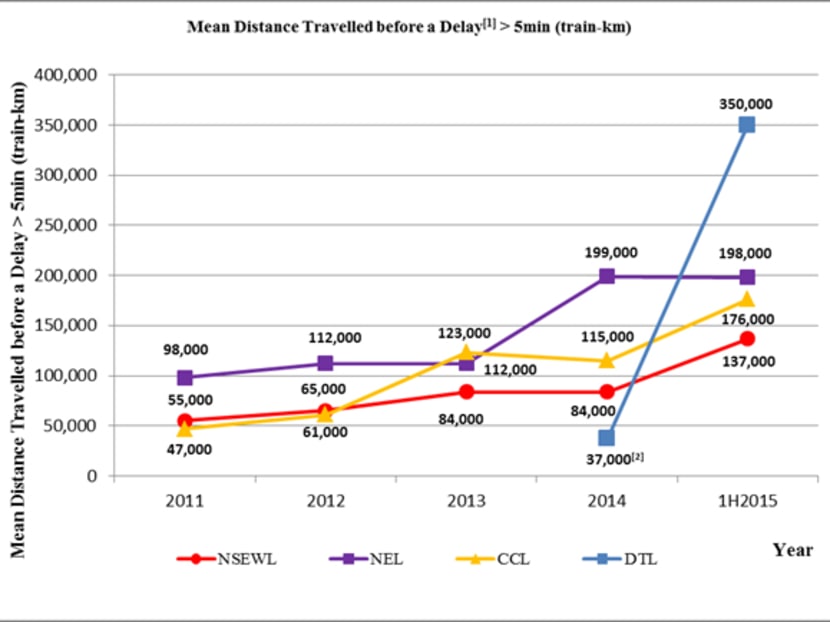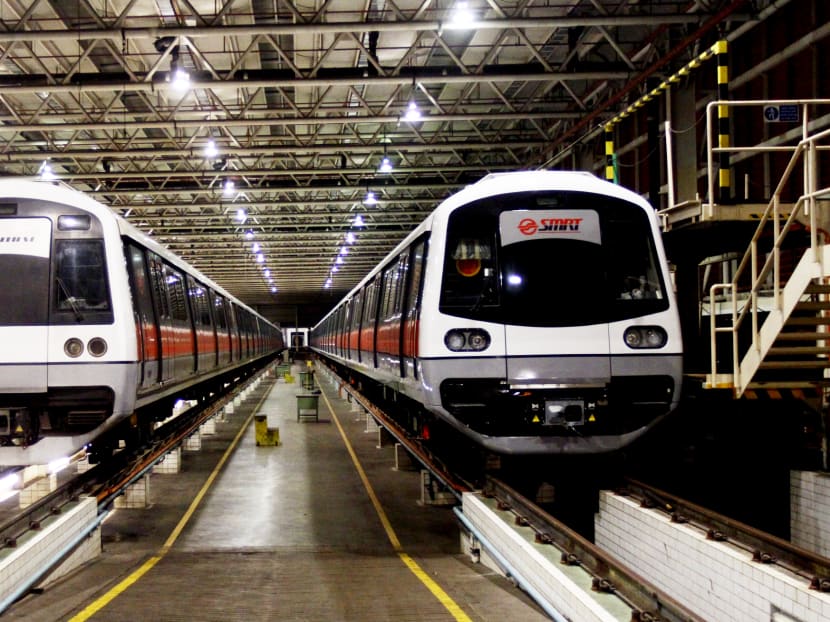Khaw aims for rail network reliability to match that of HK’s
SINGAPORE — Setting the target to catch up with Hong Kong in rail reliability, Coordinating Minister for Infrastructure and Transport Minister Khaw Boon Wan said today (Oct 9) that his immediate priority is to tackle major train disruptions that last over half an hour.
SINGAPORE — Setting the target to catch up with Hong Kong in rail reliability, Coordinating Minister for Infrastructure and Transport Minister Khaw Boon Wan said today (Oct 9) that his immediate priority is to tackle major train disruptions that last over half an hour.
He aims to study the cause of past disruptions and whether repeats can be prevented. He will also cover other possible causes of past disruptions and whether they have been addressed, he wrote on the Ministry of Transport’s blog today.
The current situation in Singapore is still “not good enough”, he said.

Mr Khaw said in his blog post that he will track this chart closely.
The average distance travelled before a delay of more than five minutes on the North-South and East-West lines is 137,000 train-km, falling short of Hong Kong Mass Transit Railway’s (MTR) performance of about 300,000 train-km.
The MTR had 12 major disruptions last year compared to 10 disruptions in Singapore, but Hong Kong’s network is significantly longer than Singapore’s, Mr Khaw said.
“We are now behind Hong Kong MTR, but we shall catch up.”
According to Land Transport Authority statistics, major disruptions have hovered between 0.03 to 0.05 per 100,000 train-km from 2011 to last year. The rate of delays lasting more than five minutes has improved between 2011 and last year, decreasing from 1.75 per 100,000 train-km to 1.17.
Issuing two blog posts today — the other was on his appointment of PUB chairman Tan Gee Paw as Adviser on Rail Transformation — Mr Khaw stressed his resolve in tackling rail disruptions, even as he appealed for time to “turn around and then stabilise the situation”.
The public should be mentally prepared for the next disruption, he cautioned. “We will be very disappointed when it happens, but we shall stand up, lick our wounds, examine the causes and work very hard to prevent a repeat.”
Mr Khaw also highlighted the importance of engineering expertise and sought to boost the morale of rail employees. “The consensus view is that we have under-invested in rail maintenance, and our engineering capabilities in this area are still lacking. We will need to ramp up investment in this area,” he said. “We will need to recruit and retain more skilled workers. All these are significant challenges, not easy to resolve quickly, but we are determined to overcome them.”
Commenting on Mr Khaw’s blog post, associate professor Marcelo Ang Jr of the National University of Singapore’s Department of Mechanical Engineering said proper design and maintenance are key in a rail system.
“In maintenance I think it’s good to have more preventive measures,” he said. “One idea is to perhaps have more sensors on tracks and (train) cars to do ‘health’ monitoring and to do more data analytics on how well the train is running.”
Sensors could measure vibrations and perhaps even sound levels, and could predict when certain parts may fail and even prolong the life of parts of the train system, he said.
SIM University adjunct associate professor Park Byung-joon said Hong Kong’s MTR is probably the world’s best in two areas: Financing and engineering reliability. He was in favour of benchmarking against Hong Kong’s rail reliability standards but not in financing, as the MTR has the power to do land planning and develop and sell properties around MTR stations.
“Finance-wise, MTR is probably the only line in the world that doesn’t need government subsidies to make a profit,” he said. “I don’t see the Land Transport Authority having the power to (do land-planning) and I don’t think it’s right to give such power to SMRT and SBS Transit.”
Assoc Prof Park also agreed with the need to enlarge the pool of engineers and improve the level of engineering expertise.
“It doesn’t mean those we have are not good ... but in terms of the total (number of engineers) we have versus the total we need, the consensus is we’re quite thin,” he said.
Mr Khaw has blogged six times since news of his appointment as Transport Minister last month. Among other topics, he has explained why he agreed to take on the role and announced a study of third-party ride-sharing apps.







